Sylvia Rivera Warned Us: Gay Men Would Abandon Trans People—And She Was Right
Gay conservatives say trans rights aren’t their fight. But what happens when they’re next?
In 1973, Sylvia Rivera stood before a crowd at the Christopher Street Liberation Day Rally and was met with boos. She was angry, exhausted, and pleading with a largely white, middle-class gay and lesbian audience to care about the most vulnerable among them—trans people, sex workers, incarcerated queer people, the homeless. Rivera, a Puerto Rican trans woman who had been on the frontlines of the Stonewall riots, had fought for a movement that, in her eyes, had already begun to exclude people like her.
Sylvia Rivera Storms the Stage
The summer heat hung heavy over Washington Square Park as thousands of people gathered for the 1973 Christopher Street Liberation Day rally. It was supposed to be a celebration—a march honoring the Stonewall uprising just a few years earlier. But for Rivera, the atmosphere felt anything but welcoming.
She had spent the day trying to get on stage, trying to get the microphone, trying to speak to the community she had fought for. And each time, she was blocked. Behind the scenes, organizers had made it clear—they didn’t want her there. Trans people, drag queens, street workers like Sylvia didn’t fit the new image they were crafting for the movement. The Gay Liberation Front, once a home for radicals, was now leaning toward respectability. White, middle-class gay men and lesbians were setting the agenda, and that agenda no longer included people like her.
But Sylvia wasn’t the kind of person to take no for an answer. She shoved, clawed, and fought her way to the stage, ignoring the hands trying to pull her back. When she finally reached the microphone, the crowd erupted—not in cheers, but in boos.
She stood there, breathless, taking in the jeering faces before her. Then, gripping the mic, she let them have it.
“Y’all better quiet down now!” she shouted, her voice slicing through the noise. “I’ve been trying to get up here all day for your gay brothers and your gay sisters in jail that write me every motherfucking week and ask for your help, and you all don’t do a goddamn thing for them!”
A Movement Turning Its Back
Rivera’s rage didn’t come out of nowhere. It had been building for years.
The same movement that once prided itself on radical defiance was becoming increasingly exclusionary. The annual Christopher Street Liberation Day had started as a commemoration of Stonewall, a night of rebellion led largely by trans women, drag queens, and people of color like Rivera and her closest friend, Marsha P. Johnson. But by the early ‘70s, that history was already being rewritten.
Gay and lesbian activists who could pass as respectable professionals—who could blend into the system—were taking the reins. The movement was moving away from street protests and toward lobbying, legal fights, and cultural assimilation. Anti-police rhetoric, once at the heart of the struggle, was fading into the background.
For Rivera, this shift was deeply personal. She and Marsha P. Johnson had founded Street Transvestite Action Revolutionaries (STAR) to support the people most at risk—homeless queer youth, sex workers, incarcerated LGBTQ+ people. These were the people who wrote to STAR, desperate for help, ignored by every other advocacy group.
“They write ‘STAR,’ not to the women’s groups. They do not write women. They do not write men. They write ‘STAR’ because we’re trying to do something for them.”
But the crowd wasn’t listening.
They didn’t want to hear about jailed street queens. They didn’t want to think about sex workers and trans women who couldn’t conform to middle-class norms. They wanted to celebrate their progress, their growing acceptance in the mainstream.
Rivera saw what was happening. The movement she had fought for was leaving its most vulnerable members behind.
A quick break …
🚨Become a paid subscriber to History Can’t Hide🚨
History Can’t Hide has now surpassed 10,000 followers (in just three weeks) and I have more than 18 pieces published in our vault of exposed American secrets (that’s about one piece of content every single day)!
But uncovering hidden history isn’t easy. High-quality research takes time and with so much misinformation and historical erasure out there, the urgency to tell these stories is real. I want to expand this work, but I can’t do it alone.
When you upgrade to a paid subscriber, this helps me to:
📚 Invest in high-quality research to bring you the most accurate and well-sourced history content.
🎥 Expand production—I want to create longer, more in-depth videos across platforms like YouTube and video podcasts right here on Substack.
💼 Hire young historians and researchers, especially from underrepresented communities, to help uncover more stories.
✈️ Travel to historical sites and conduct primary source research for deeper storytelling.
Now back to the story 👇🏾
Respectability Over Revolution
Historian Jules Gill-Peterson (author of “A Short History of Trans Misogyny” which you can purchase with this affiliate link) describes this period as a turning point. By the early 1970s, the face of gay liberation was shifting. It was becoming whiter, more cisgender, more male, more middle-class. It was becoming more focused on legal reform and institutional recognition rather than grassroots action.
This wasn’t an accident—it was a deliberate strategy. Respectability politics had taken hold. Many in the movement believed that the best way to achieve progress was to distance themselves from the “undesirable” elements of the community—the trans women, the street queens, the sex workers, the homeless youth.
In their eyes, people like Sylvia Rivera were liabilities.
But Rivera wasn’t about to go quietly.
“I have been beaten. I have had my nose broken. I have been thrown in jail. I have lost my job. I have lost my apartment for gay liberation. And you all treat me this way? What the fuck’s wrong with you all?”
By the end of her speech, she was exhausted, tears mixing with sweat as she led the crowd in a final chant: “Gay power! Louder! GAY POWER!”
Some joined in. Others stood in silence, arms crossed.
Rivera walked off stage, knowing she had said what needed to be said.
But she also knew the truth—her fight for a truly inclusive movement was far from over.
The Long-Term Consequences: How History is Repeating Itself
Rivera’s speech in 1973 wasn’t what broke the LGBTQ+ movement—it just made the existing fractures impossible to ignore. By the late ‘70s and ‘80s, mainstream LGBTQ+ activism had largely shifted toward respectability politics. As documented in “Coming Out Republican” (purchase with my affiliate link here), many gay conservatives embraced a strategy of assimilation, advocating for LGBTQ+ inclusion within existing power structures rather than challenging them. The fight for gay rights became a campaign for marriage equality, military service, and corporate diversity initiatives—prioritizing the needs of cis, white, middle-class gay men while sidelining the most marginalized members of the community.
Fast forward to today, and we’re seeing a similar split, but with an even more explicit rejection of queer solidarity. Conservative LGBTQ+ factions, like the Log Cabin Republicans and Gays for Trump, are not just distancing themselves from trans people and radical activism—they’re actively working against them. The same rhetoric once used to separate “respectable” gay men from street queens in the 1970s is now being weaponized against trans people, as wealthy, white gay conservatives argue that LGBTQ+ rights are “settled” and blame trans activism for making the community politically unpopular.
The New Gay Conservatism: ‘We Got Ours, So Screw You’
A growing number of wealthy, (white) gay (wo)men are claiming the LGBTQ+ fight is “over” for them. As far as they’re concerned, they’ve won: they can get married, they can climb the corporate ladder, and they don’t face the same level of legal discrimination they once did. To them, trans issues are separate—someone else’s fight.
Michael Doherty, a Gen Z conservative influencer, made this clear when he said, “Us being lumped into the rest of the [LGBTQ+] group is what’s causing a lot of hatred toward gay people again.” Translation: If we just cut the trans people loose, maybe conservatives will like us more.
Similarly, right-wing commentator Rob Smith, a Black gay conservative, dismissed trans rights altogether, saying, “Trans ideology has zero to do with me as a gay male who is perfectly fine and comfortable in my biological sex.” The message here is clear: trans people—and the broader queer community—are a liability.
The irony of Smith’s position is striking. He has built his career on the idea that LGBTQ+ people can find full acceptance within the Republican Party if they reject what he sees as leftist radicalism. He has repeatedly positioned himself as proof that a Black gay man can thrive in conservative spaces, arguing that “identity politics” are unnecessary and that LGBTQ+ people should prioritize issues like the economy and national security over social justice.
And yet, at a 2023 MAGA event in Phoenix, Smith himself became a target of the very forces he had aligned with. He was heckled by white supremacists who, according to his account, shouted both racist and homophobic slurs at him. In a video he shared, attendees can be heard chanting “gay sex” mockingly before switching to “America First.” Smith later wrote that they had also called him the N-word and the F-slur, making it clear that, to some in the conservative movement, his identity was still unacceptable—no matter how much he distanced himself from other marginalized groups.
Smith’s experience underscores a painful truth: no matter how much some conservative gay men try to assimilate, they will never be fully embraced by a movement that is fundamentally hostile to difference.
MAGA Meets the ‘Normal Gay Guy’
For some, the appeal of right-wing politics isn’t just about policies—it’s about aesthetics. A gay publicist summed up the bizarre appeal of MAGA to some gay men, saying, “Democrats are the most killjoy people on earth… whereas there’s something actually quite gay about MAGA. It’s masculine, but it’s also campy and bitchy.”
This new wave of conservative gay men has embraced the term “normal gay guy,” a phrase coined by JD Vance during an interview on “The Joe Rogan Experience”. Vance speculated that Trump’s campaign would appeal to “normal gay guys”—gay men who just “want to be left the hell alone” and are tired of what they see as a radicalized LGBTQ+ movement. He suggested that these men had already won their fight for equality and were now being burdened with “all this crazy stuff on top of it.”
In their eyes, Trump isn’t just a politician—he’s a drag character. The flamboyance, the insults, the over-the-top bravado—it all feels familiar to those raised in gay male culture. Some have even gone so far as to call him the “gayest president we’ve ever had.”
At exclusive penthouse parties, members of the Log Cabin Republicans sip wine, joke about “woke leftists,” and insist that Trump is actually a friend to gays. Never mind that he spent his last campaign pushing hundreds of millions of dollars in anti-trans attack ads. Never mind that his Supreme Court appointees have already signaled they’re open to revisiting Obergefell v. Hodges, the ruling that legalized same-sex marriage. These men don’t see the writing on the wall—or worse, they don’t care.
The Legal Reality: If Trans Rights Fall, Gay Rights Are Next
While conservative gay men may believe their rights are “settled,” the political landscape tells a different story. The same forces that are dismantling trans rights today could easily pivot to rolling back protections for all LGBTQ+ people.
Legal scholars warn that the justifications being used to attack trans people—claims about “protecting children,” “maintaining biological reality,” and “keeping radical ideology out of public life”—are eerily similar to the rhetoric used against gay people in the ‘70s and ‘80s. Neil J. Young, a historian of LGBTQ+ conservatism, put it bluntly: “Republicans’ focus on trans people is an opening wedge issue into a broader attack on LGBT rights.”
And the conservative legal machine is already laying the groundwork. In multiple states, Republican lawmakers have introduced bills to challenge same-sex marriage rights and protections against LGBTQ+ workplace discrimination. The Supreme Court, fresh off overturning Roe v. Wade, has justices who have openly questioned the legitimacy of past rulings protecting gay rights.
Yet, within pro-Trump gay circles, there’s a shocking level of denial. Peter Boykin, founder of Gays for Trump, brushed off concerns about anti-gay policies, saying, “The Supreme Court has made the decision. It is now also the law of the land. It is not changing.”
If that sounds familiar, it should—people once said the same thing about abortion rights before they were gutted.
Sylvia Rivera’s Warning is More Relevant Than Ever
Sylvia Rivera saw all of this coming. She knew that when push came to shove, those with privilege would abandon those without. She knew that trans people, sex workers, incarcerated queers, and the most vulnerable among us would always be the first sacrificed for political convenience. The speech in 1973 was not just about trans rights—it was about the dangers of selective advocacy. She understood that liberation could not be piecemeal and that excluding the most vulnerable would ultimately weaken the movement as a whole.
Today, we are watching history repeat itself. White, wealthy, conservative gay men believe they are safe—but they won’t be for long. The moment they made their liberation conditional, they gave those in power permission to take it away.
References
Anderson, Lydia. “Hell Hath No Fury Like a Drag Queen Scorned: The Revolutionary Voice of Sylvia Rivera.” Gender & Sexuality in World History, December 5, 2024.
Gill-Peterson, Jules. “'Y’all Better Quiet Down': Sylvia Rivera & the Fractures of Gay Solidarity.” Verso, June 12, 2024.
Lefferts, Daniel. “My Afternoon With the ‘Normal Gay Guys’ Who Voted for Trump.” GQ, February 10, 2025.
Macnaughton, Spencer, and Abbie Thompson. “The 13%: Why These LGBTQ Voters Are Thrilled About Trump’s Win.” Uncloseted Media, November 16, 2024.
Macnaughton, Spencer, and E. E. Oliver. “'He's Talking to the Wrong People': Gays For Trump Founder's Message to the President.” Uncloseted Media, January 25, 2025.
Neugeboren, Eric. “'We Failed': Gay Republicans Who Fought for Acceptance in Texas GOP See Little Progress.” The Texas Tribune, July 24, 2022.
Rahman, Khaleda. “Black, Gay Republican Heckled With Slurs at MAGA Event.” Newsweek, December 19, 2023. Updated December 20, 2023.


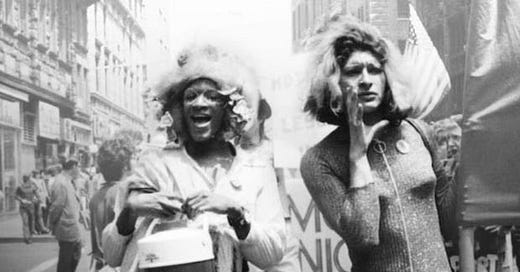



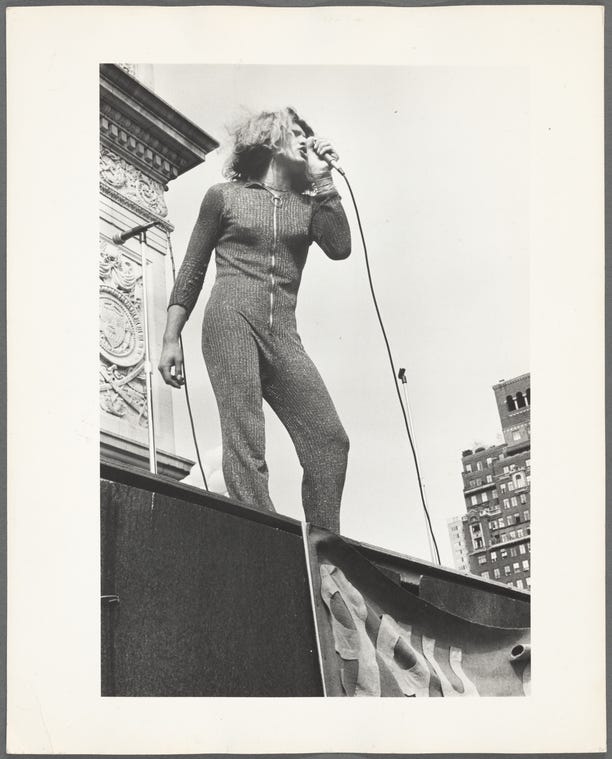

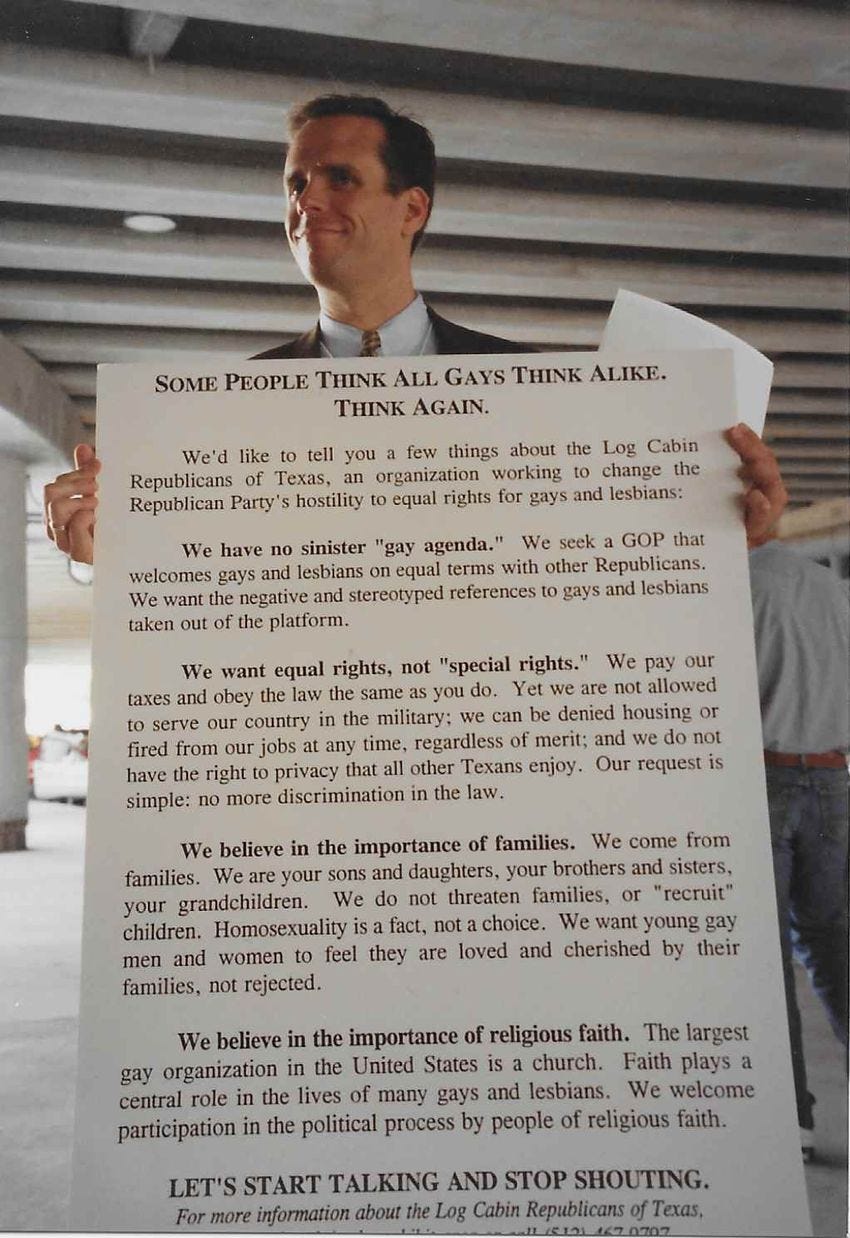
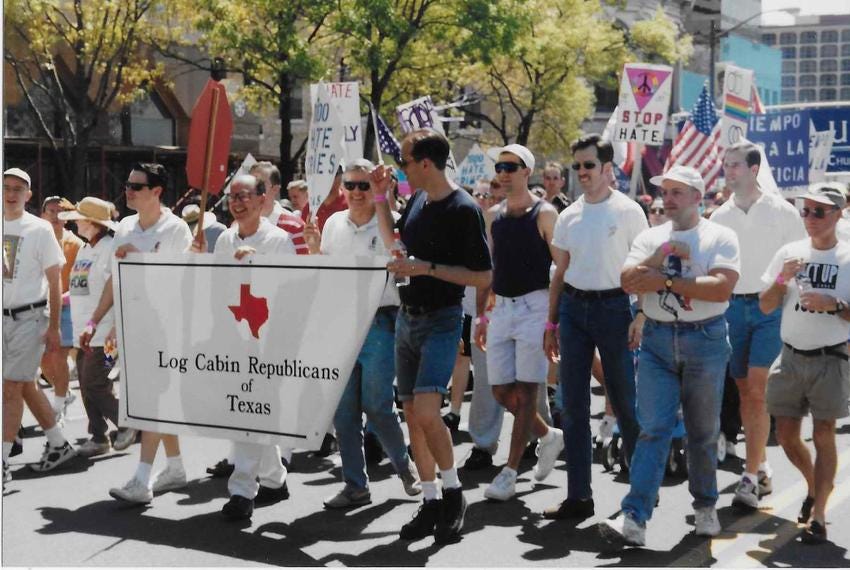
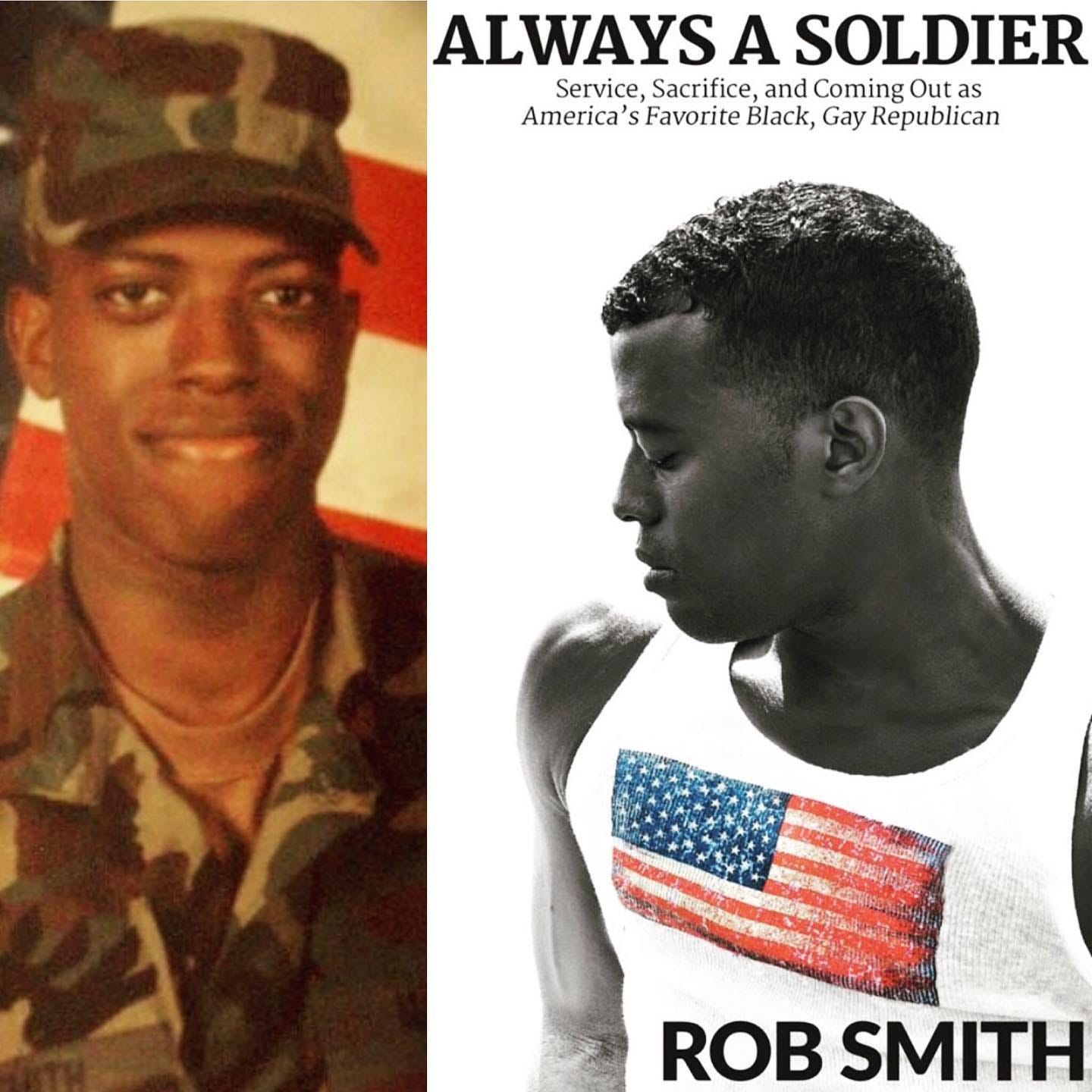
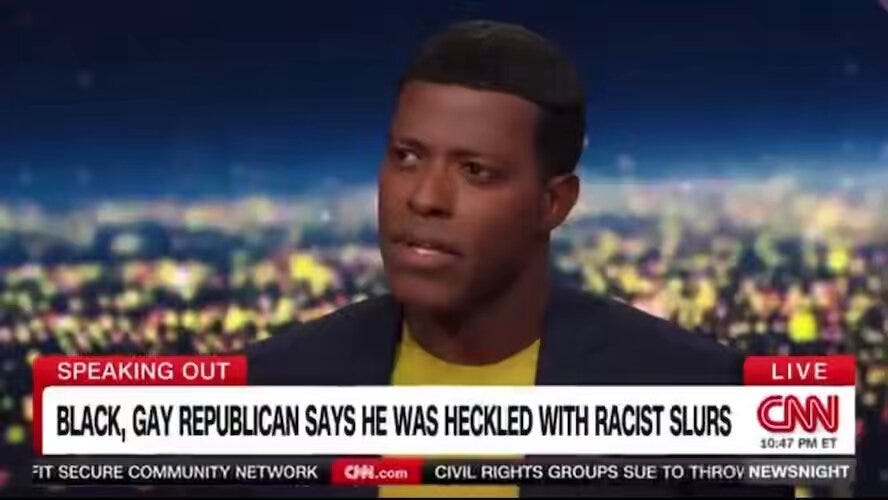
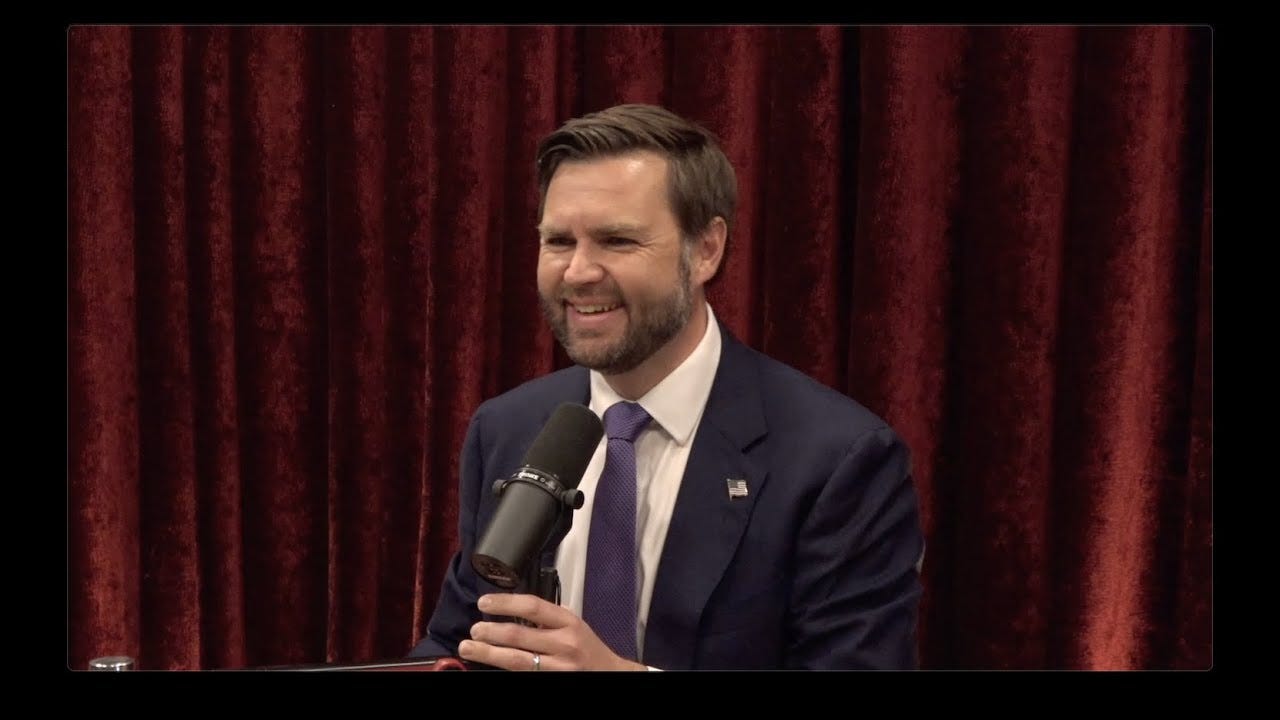


“First they came for the Communists,
and I didn’t speak up,
because I wasn’t a Communist.
Then they came for the Jews,
and I didn’t speak up,
because I wasn’t a Jew.
Then they came for the Catholics,
and I didn’t speak up,
because I was a Protestant.
Then they came for me,
and by that time there was no one
left to speak up for me.”
Martin Neimoller
I was alive for all of this. Pay attention and don’t take the bait.